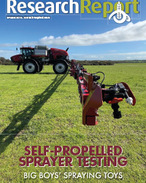This article is 2 years old. Images might not display.
NFF President, Fiona Simson, said the operation, which saw raids on facilities in Western Sydney, is an important example of how Australia's biosecurity services protect our community, environment and economy.
"That illegal stockpile of exotic meats was a potential biosecurity hazard in the heart of our largest city," Simson said.
"It's shocking to think that people would be potentially so reckless right here in our own backyard.
"Australia is fortunate to be free of so many serious pests and diseases that could decimate our natural environment and our ability to produce food and fibre. This is achieved in no small part thanks to our rigorous biosecurity systems and import protocols.
"Engaging in any contravention of these systems is simply unacceptable, and could devastate our economy, our environment, and our food systems."
Simson said this example highlights the critical role Australia's biosecurity services play, and why they need to keep pace with mounting challenges.
"We're lucky to have one of the most advanced biosecurity regimes on the planet, staffed by highly skilled and dedicated professionals," she said.
"However, we're starting to see cracks appear in an increasingly complex biosecurity environment. Increasing trade flows, diseases pressures in our region and climatic changes are just some of the factors putting pressure on our system.
"This isn't the moment to let our guard down. With diseases like Foot and Mouth Disease and Lumpy Skin Disease threatening our livestock industries and myriad other risks to our horticulture and plant industries, we need to pull out all stops. That starts with injecting adequate and sustainable funding into the system.
"All eyes now turn to Minister Watt ahead of the May Federal Budget. We're eager to see material progress on a long-awaited sustainable funding mechanism to ensure our system is appropriately resourced and our dedicated biosecurity professionals can continue to do their important work into the future."























